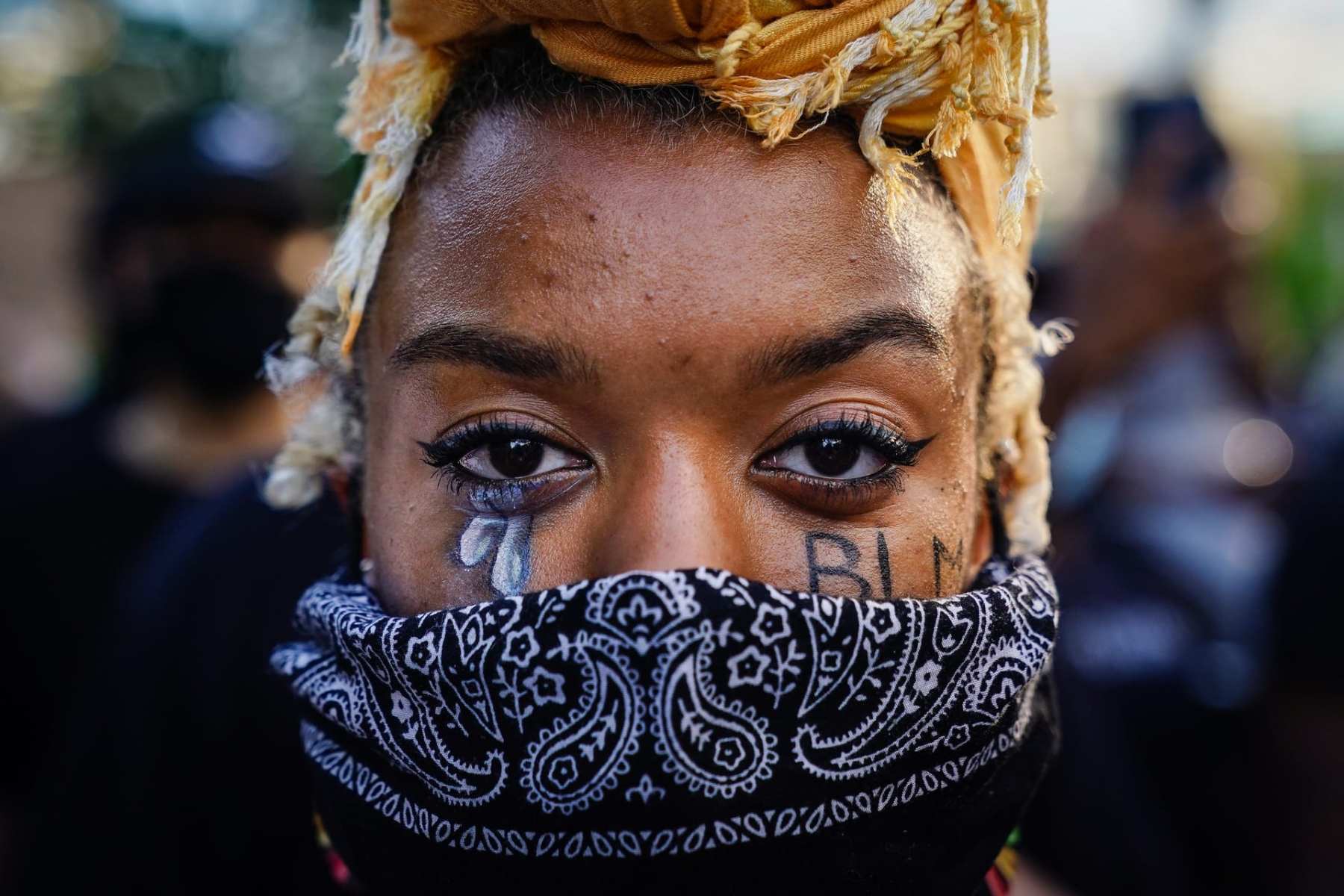Since The 19th launched in August, we have reported on America’s dual pandemics — COVID-19 and systemic racism — the centennial of (some) women’s right to vote and — of course — the coronavirus. And we’ve covered it all at the intersection of gender, politics and policy.
Although The 19th is one of the only newsrooms in the country exclusively reporting through that lens, many others are also doing that critical work. Throughout the year, we have elevated excellent pieces of journalism from other outlets on social media with our #19threads hashtag and in our newsletters.
This year shined a spotlight on the resilience and struggles of women, LGBTQ+ people and all others underrepresented in our democracy — the inequities they face. Here, we take a look back at the stories that most impacted us.
Coronavirus
What I learned when my husband got sick with coronavirus
By Jessica Lustig | The New York Times Magazine
March 24
When Jessica Lustig’s husband got coronavirus, her family’s world became one of isolation, round-the-clock care, panic and uncertainty — even as society carried on around them with little interruption. “We are living inside the news stories of testing, quarantine, shortages and the disease’s progression,” Lustig wrote.
New Zealand’s prime minister may be the most effective leader on the planet
By Uri Friedman | The Atlantic
April 19
The coronavirus pandemic may be the largest test of political leadership the world has ever witnessed. Every leader on the planet is facing the same potential threat, but every leader is reacting differently — and will ultimately be judged by the results. In New Zealand, Jacinda Ardern’s leadership style — focused on empathy — isn’t just resonating with her people; it’s putting the country on track for success against the coronavirus.
Voices from the pandemic: ‘It was me. I know it was me.’
As told to Eli Saslow | The Washington Post
May 30
Francene Bailey passed the coronavirus to her mother, who later died. People, like doctors at the hospital and her pastor, kept telling her it wasn’t her fault. “I got sick and then she got sick. I lived and she died,” Bailey told Eli Saslow. “How am I supposed to let go of that?”
Homework in a McDonald’s parking lot: Inside one mother’s fight to help her kids get an education during coronavirus
By Bracey Harris | The Hechinger Report
June 27
Terri Johnson, a single mother of four in the Mississippi Delta, is doing all she can trying to homeschool her children while fighting to make ends meet. Her story, similar to that of many mothers in the Deep South, is a look into how the pandemic is shattering the fragile lifeline to Mississippi’s rural low-income population.
‘Crashing down’: How the child care crisis is magnifying racial disparities
By Eleanor Mueller | POLITICO
July 21
Ninety-three percent of child care workers are women, and 45 percent are Black, Asian or Latinx. Half of child care businesses are minority-owned. At the same time, Black and Latina mothers are more likely to be the family breadwinners, more likely to hold low-paying jobs, more likely to be considered essential workers and more likely to live in child care deserts. It’s a double-barreled blow for Black women and Latinas as coronavirus-induced shutdowns batter the child care industry.
America is failing Black moms during the pandemic
By Anna North | Vox
August 10
Long before the pandemic hit, Black women around the country were reporting that doctors disregarded their concerns, ignored their wishes and put them at risk. Out of 10 similarly wealthy countries, the United States had the highest number of pregnancy-related deaths per capita in 2018. Now, the pandemic has made the pregnancy mortality crisis worse, and it doesn’t have to be this way.
For Muslim women in niqabs, the pandemic has brought a new level of acceptance
By Tasmiha Khan | Vanity Fair
August 21
“Just like with everything, this current pandemic has changed things for niqabis, veiled-face women.”
America at Hunger’s Edge
The New York Times
September 2
A shadow of hunger looms over the United States. In the pandemic economy, nearly one in eight households doesn’t have enough to eat. The lockdown, with its epic lines at food banks, has revealed what was hidden in plain sight: the struggle to make food last long enough, and to get food that’s healthful is persistent for millions of Americans.
How my mother and I became Chinese propaganda
Jiayang Fan | The New Yorker
September 7
Jiayang Fan tells the story of immigrant struggles in America that helped her forge a bond with her mother, which became even tighter after her mother’s ALS diagnosis. Then, when the pandemic hit, Fan’s attempts to ensure her mother was properly taken care of unexpectedly made them a target of Chinese nationalists, who called them traitors to their country.
The enraging deja vu of a third coronavirus wave
By Caroline Chen | ProPublica
November 13
Health care workers — 75 percent of whom are women — don’t need patronizing praise. They need resources, federal support and for Americans to stay healthy and out of their hospitals. In many cases, as health reporter Caroline Chen wrote, none of that is happening.
The parental burnout crisis has reached a tipping point
By Anna North | Vox
December 8
The demands of parenting in a pandemic are leading to stress, anxiety and depression, not to mention economic hardship for those forced to leave their jobs, many of them women, to care for kids. And while some parents are figuring out ways to lighten their burden, some say what’s needed are systemic changes to work, education and child care in America.
COVID-19 unemployment hit Latina immigrants the hardest
By Tina Vásquez | Prism
December 22
To say the COVID-19 crisis has decimated the United States would be an understatement. Since March, tens of millions of people have lost their jobs and are now facing food insecurity and eviction. However, there is one group for whom pandemic unemployment has been particularly brutal and unrelenting: Latina immigrants.
Election 2020
The immoderate Susan Collins
By Rebecca Traister | New York Magazine
February 18
Pollsters predicted Susan Collins, the longtime senator from Maine, would be defeated in her bid for a fifth Senate term. So after a long career voting across the aisle, why did she gamble her legacy on Donald Trump?
Kamala Harris, mass incarceration and me
By Reginald Dwayne Betts | The New York Times
October 20
Many progressives distrust Kamala Harris because of her past as a prosecutor. As an ex-convict — and also the son of a crime victim — Reginald Dwayne Betts can tell you it’s not that simple.
Don’t count out the Latina vote
By Christian Paz | The Atlantic
October 26
Latinas could very well become a dominant force in American elections to come, but they have to be convinced of their own power first.
‘I just couldn’t be silent’: How American women decided the 2020 presidential race
By Mica Rosenberg, Gabriella Borter, P.J. Huffstutter, Mimi Dwyer and Chris Kahn | Reuters
November 7
Women appear to have been crucial in delivering the U.S. presidency to Joe Biden. They were at the forefront of the highest U.S. voter turnout in at least a century, casting ballots at higher rates than men.
Here’s what Kamala Harris faces as a ‘first’
By Teresa Wiltz | POLITICO Magazine
November 8
Kamala Harris may claim more “first evers” than any other politician sworn into national office. But in this moment, she’s also joining an equally exclusive club of first-evers, women of color who aimed their stilettos — or Chucks — at glass ceilings and kicked. The roads these other “firsts” traveled in American politics offer some lessons for Harris.
Grassroots organizers flipped Georgia blue. Here’s how they did it.
By Anoa Changa | Truthout
November 12
Georgia flipping blue may have caught some people by surprise, but to those organizing on the ground – particularly the women of color – for the past several years, this moment was always a possibility. The story of the state’s flip is best told through the experiences of the organizers who have been rooted in the community beyond presidential election cycles.
How the Navajo Nation helped Democrats win Arizona
By Rachel Ramirez | Vox
November 12
Indigenous voters have often been overlooked by both political parties. But they may have been key in turning swing states — like Arizona, which has gone Republican in every presidential election but one in the past 60-odd years — for Democrats.
The results are in: A record-breaking 334 LGBTQ+ politicians were elected in 2020
By Nico Lang | them.
December 9
This year’s rainbow wave shined brighter than ever, with more queer people being elected to office — at all levels of government — during the 2020 election cycle than any year in history. “This beautiful diversity provides an opportunity to connect on some level with every single voter in America,” said Annise Parker, president and CEO of The Victory Fund.
19th Amendment centennial
A pandemic nearly derailed the women’s suffrage movement
By Ellen Carol DuBois | National Geographic
April 20
Suffragists had been fighting for women’s right to vote for 70 years, victory seemed almost in reach — then, the Spanish flu struck. Yet women leaders continued, overcoming influenza, social distancing and political bias to win the right to vote.
In 1920, Native women sought the vote. Here’s what’s next.
By Cathleen D. Cahill and Sarah Deer | The New York Times
July 31
While the 19th Amendment did not bring the right to vote to all Native women, they were highly visible in early 20th century suffrage activism, reminding newly enfranchised White women that the fight was not over.
Women won the right to vote 100 years ago. They didn’t start voting differently from men until 1980.
By Amelia Thomson-DeVeaux and Meredith Conroy | FiveThirtyEight
August 19
Women officially won the right to vote just a few months before the 1920 presidential election, and as soon as the 19th Amendment was ratified, suffragists were predicting a sea change in American politics. One activist even proclaimed that “the women’s vote is going to be a tremendous factor in this election.” And that did happen, eventually, but it wasn’t until 1980 that equal shares of men and women cast a ballot.
What the 19th Amendment meant for Black women
By Martha S. Jones | POLITICO Magazine
August 26
The 19th Amendment’s adoption looked very different to America’s 5.2 million Black women — 2.2 million of whom lived in the South, where Jim Crow laws threatened to keep them off the registration books. For Black women, August 1920 wasn’t the culmination of a movement. It marked the start of a new fight.
Best of the rest
The disappeared
By Aura Bogado | Reveal
February 18
For six years, a North Carolina family has tried to find out what the U.S. government did with its children after they were separated at the border. One child, a girl, now 17, has been in U.S. immigration custody since she was 10 — a long-term resident of what’s supposed to be a short-term system.
How Monica Roberts became one of America’s most respected Black trans journalists
By Ashia Ajani | them.
February 29
Storytelling has been a cornerstone of the Black tradition since before the trans-Atlantic slave trade. It was (and still is) a way to harbor memory, pass on tradition from generation to generation and honor the histories that make up Black life. That’s exactly what Monica Roberts did through her pioneering reporting and opinion on the Black trans community for 14 years.
How climate change affects women more — and why they need to be listened to
By Emily Chan | Vogue India
March 9
Women are on the frontline of fighting climate change around the world, but they’re still hugely underrepresented when it comes to making decisions. Vogue’s Emily Chan looks at why addressing gender inequality is essential when it comes to tackling the crisis facing our planet.
Meet the forgotten woman who forever changed the lives of LGBTQ+ workers
By Brianne Garrett and Leah Rosenbaum | Forbes
June 26
As a civil rights activist, feminist and attorney, Pauli Murray influenced Martin Luther King, Jr., Eleanor Roosevelt and Ruth Bader Ginsburg. And with a single word in the Civil Rights Act of 1964, she bent the arc of the moral universe.
She said her husband hit her. She lost custody of their kids.
By Kathryn Joyce | The Marshall Project
July 8
A 2004 study found that mothers were more likely to receive primary custody if they had not made allegations of domestic abuse, while fathers were equally likely to get custody whether there were allegations against them or not.
Vanessa Guillén’s murder prompts veterans to come forward with their stories of sexual assault and abuse
By Ali Rogin | PBS NewsHour
July 13
The details of Army Spc. Vanessa Guillén’s murder are gruesome, but it wasn’t just the horrifying nature of her case that spurred a movement — it was about how universal it felt. “I saw myself in her,” said Army veteran Ashley Martinez.
The women making conspiracy theories beautiful
By Kaitlyn Tiffany | The Atlantic
August 18
Instagram is women’s work, Kaitlyn Tiffany writes, as it demands skills they’ve historically been compelled to excel at: presenting as lovely, presenting as desirable, presenting as good, safe, nonthreatening. All of which, of course, are valuable appearances for a dangerous conspiracy theory like QAnon — to be repackaged for the masses on Instagram.
A tale of two pandemics: Breonna Taylor and COVID-19
By Mikeisha Dache Vaughn | Complex
August 25
The murder of Breonna Taylor, a 26-year-old Black woman fatally shot in her Louisville, Kentucky apartment by police, placed America in an unavoidable conversation about the country’s dual pandemics — coronavirus and systemic racism.
The glorious RBG
By Irin Carmon | New York Magazine
September 18
Only someone so stubborn and single-minded, someone so in love with the work, could have accomplished what Ruth Bader Ginsburg did, Irin Carmon writes. As a woman, Ginsburg survived discrimination and loss; as a lawyer, compelled the Constitution to recognize that women were people; as a justice, inspired millions of people in dissent.
The year the entire WNBA became political players
By Louise Radnofsky and Rachel Bachman | The Wall Street Journal
October 2
Years before the NFL painted “End Racism” in its end zones, before NBA players emblazoned their jerseys with social justice messages endorsed by the league, WNBA players were demonstrating for change — and getting in trouble for it. And while the women’s basketball league has long included activism, in 2020, it built a season on it.
1.3 million women enter menopause each year. We have to stop ignoring them
By Macaela MacKenzie | Glamour
October 7
Menopause is not an “old woman” thing — the oldest millennials, at 39, are now entering the perimenopausal period. But despite the fact that every woman will go through it, menopause remains one of the last great taboos in women’s health.
Rooted in faith, Amy Coney Barrett represents a new conservatism
By Elizabeth Dias, Rebecca R. Ruiz and Sharon LaFraniere | The New York Times
October 11
Amy Coney Barrett’s background and résumé are a stark departure from those of more traditional nominees to the Supreme Court.
Economist found $16 trillion when she tallied cost of racial bias
By Saijel Kishan | Bloomberg Businessweek
October 20
As protests against racial injustice erupted across the United States in late May, economist Dana Peterson set aside her usual work to try her hand at something few in her field have attempted: quantifying the cost of racism to the world’s largest economy. The process helped exorcise some of her own experiences of racism too.
The bind of being first
By Kaitlyn Greenidge | Harper’s BAZAAR
October 21
Novelist Kaitlyn Greenidge reflects on our cultural fixation with and celebration of firsts, asking: Who never got the chance to try?
When falling behind on rent leads to jail time
By Maya Miller and Ellis Simani, with additional reporting by Benjamin Hardy | ProPublica
October 26
Evictions in Arkansas can snowball from criminal charges to arrests to jail time because of a 119-year-old law that mostly impacts renters who are women, Black and low-income. Even prosecutors have called it unconstitutional.
“No choice but to do it”: Why women go to prison
By Justine van der Leun | The New Republic
December 17
Many of the 230,000 women and girls in U.S. jails and prisons were abuse survivors before they entered the system. And at least 30 percent of those serving time on murder or manslaughter charges were protecting themselves or a loved one from physical or sexual violence.




